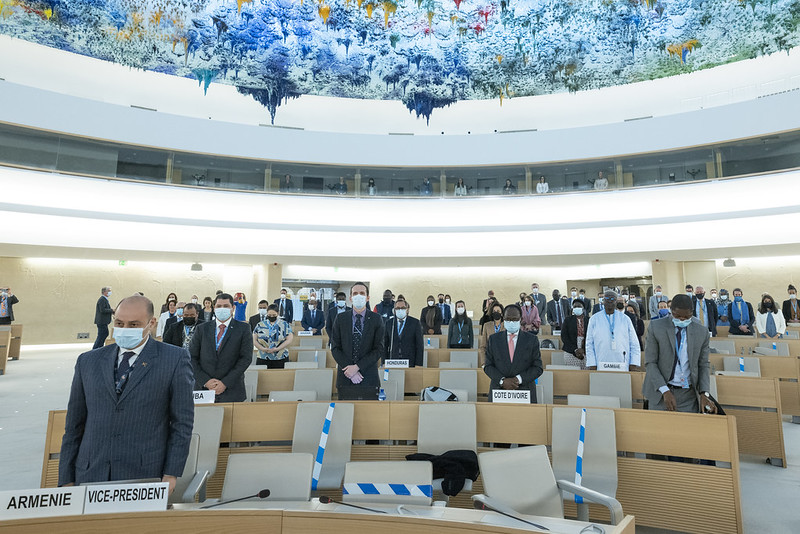The Human Rights Council this afternoon began its general debate on human rights situations requiring its attention, hearing statements from numerous delegations*.
In this year of the seventy-fifth anniversary of the Universal Declaration of Human Rights, the importance of the promotion and protection of human rights was repeatedly emphasized by the speakers. Many of them expressed concern about the regression of human rights around the world.
The attention of the Council has been drawn to a large number of violations of human rights and international humanitarian law committed in many countries, regions and territories around the world. In particular, restrictions on the space granted to civil society, as well as surveillance and reprisals targeting the political opposition, human rights defenders and journalists, were denounced. Many speakers were also concerned about restrictions on freedoms of expression, opinion and assembly throughout the world as well as the use of arbitrary detention, torture and ill-treatment.
Violations against vulnerable people, particularly LGBTI people, national minorities, women and girls, were particularly denounced. The use of the death penalty, which continues in several countries around the world, was also condemned by several speakers.
The situation of migrants, particularly in many European countries, was also discussed and the large number of deaths that occur when crossing the Mediterranean was deplored.
Several speakers insisted on the importance of fighting religious intolerance and respecting freedom of religion or belief. In particular, the rise of Islamophobia around the world was deplored, as well as attacks against Christian minorities in certain regions of the world. A call has been launched for human rights education to combat stereotypes and discrimination.
Many delegations reaffirmed their support for the Office of the High Commissioner for Human Rights and States were called upon to cooperate fully with the Council’s mechanisms and to authorize visits by special procedures mandate holders.
Several speakers affirmed that human rights issues must be addressed in a constructive, non-confrontational, non-politicized, impartial, non-selective, transparent and dialogue-based manner, in a fair and equitable manner, with objectivity and respect for the national sovereignty and territorial integrity of States, as well as the principle of non-interference in the internal affairs of States, taking into account the historical, social, religious and cultural particularities of each country. Some delegations denounced the mandates created by the Council without the agreement of the countries concerned. Country-specific human rights situations must be examined on the basis of constructive dialogue and exchange with the countries concerned, it was urged.
Furthermore, it was emphasized that prioritizing certain human rights over others is not consistent with the fundamental architecture of human rights. The Council was thus encouraged to pay due attention to issues, notably poverty, underdevelopment and climate change, which cannot be dissociated from any meaningful discussion relating to human rights.
Tomorrow morning, from 10 a.m., the Council will hold a panel discussion on the cyberbullying of children, before continuing its general debate on human rights situations that require its attention.
*List of speakers: Côte d’Ivoire (on behalf of the African Group), Pakistan (on behalf of the Organization of Islamic Cooperation), Spain (on behalf of the European Union), Venezuela (on behalf of a group of countries), Azerbaijan (on behalf of the Non-Aligned Movement), Libya (on behalf of the Arab Group), Venezuela (on behalf of a group of countries), Czech Republic, Luxembourg, Finland, France, Ukraine, United States, Malawi, Belgium, Georgia, Germany, Bolivia, Pakistan, United Kingdom, Cuba, Algeria, Gambia, India, China, Viet Nam, Eritrea, Switzerland, Iran, Netherlands, Japan, Israel, Austria , Armenia, Cyprus, Turkiye, Norway, Ireland, Canada, Russian Federation, Indonesia, Australia, Estonia, Venezuela, Afghanistan, Democratic People’s Republic of Korea, Denmark, Belarus, Sweden, Azerbaijan, Syrian Arab Republic, South Sudan, Burundi , Republic of Korea, Nicaragua, Zimbabwe, Saudi Arabia, Iceland.
The following non-governmental organizations also took part in the debate: Fundacion Vida – Grupo Ecologico Verde, Christian Solidarity International (CSI), International Foundation Witnesses Ashoora, Iran Autism Association, International Committee for the Respect and Application of the African Charter of Rights of Man and Peoples (CIRAC), Human Is Right, Movement against racism and for friendship between peoples, International Association of Justice Watch, Elizka Relief Foundation, Helsinki Foundation for Human Rights, Justiça Global, Beijing NGO Association for International Exchanges, Iranian Thalassemia Society, Coordination of associations and individuals for freedom of conscience, Khiam Rehabilitation Center for Victims of Torture, East and Horn of Africa Human Rights Defenders Project, Iranian Elite Research Center, The International Humanitarian Society for Development Without Borders, World Evangelical Alliance, International Council Supporting Fair Trial and Human Rights, The Institute for Protection of Women’s Rights (IPWR), Global Institute for Water, Environment and Health, International Institute for Rights and Development, European Law Center, justice and human rights, Maryam Ghasemi Educational Charity Institute, Center for Human Rights and Peace Advocacy, Center Europe – third world, Mother of Hope Cameroon Common Initiative Group, Rajasthan Samgrah Kalyan Sansthan, Jameh Ehyagaran Teb Sonnati Va Salamat Iranian , Organization for Defending Victims of Violence, Rahbord Peimayesh Research & Educational Services Cooperative, Medical Support Association for Underprivileged Iranian Patients, Association for the Defense of Human Rights and Democratic/Cultural Demands of the Azerbaijani-Iranian People – “ARC”, Institute of Sustainable Development, Youth Parliament for SDG, Peace Brigades International, BADIL Resource Center for Palestinian Residency and Refugee Rights, United Nations Watch, Americans for Democracy & Human Rights in Bahrain Inc, Humanists International, Union of Northwest Human Rights Organization, Minority Rights Group, Africa Culture Internationale, Jubilee Campaign, International Lesbian and Gay Association, Article 19 – International Center Against Censorship, and Cairo Institute for Human Rights Studies.
This article is originally published on ohchr.org


